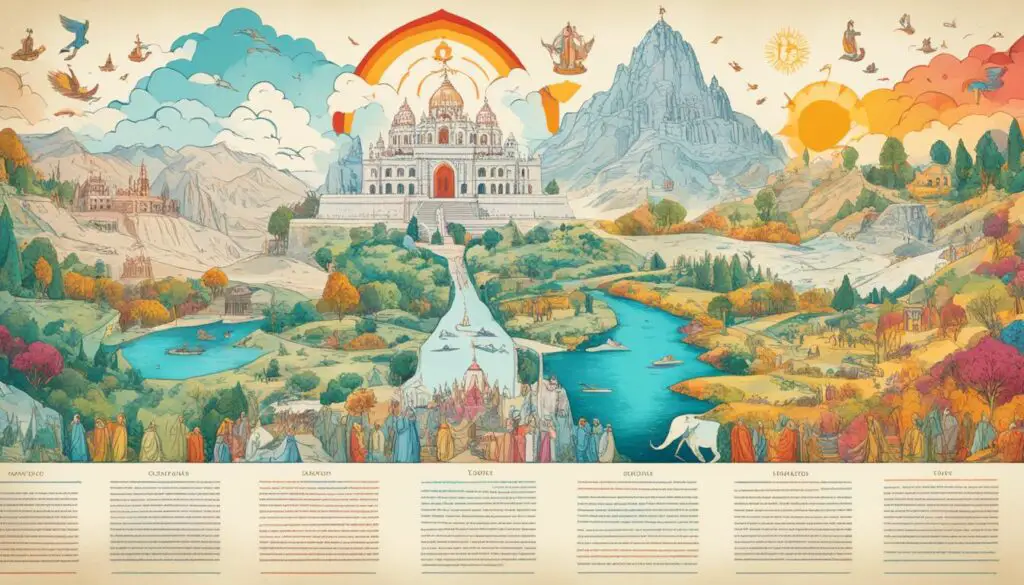The Bible and the Bhagavad Gita are two sacred texts that hold significant religious and spiritual value for millions of people around the world. Both texts offer guidance and teachings, but they differ in their origins, beliefs, and cultural contexts. In this article, I will explore and compare the key differences between the Bible and the Bhagavad Gita, providing insights into their unique perspectives.

Key Takeaways:
- The Bible and the Bhagavad Gita are revered texts in their respective religions.
- The Bible emphasizes monotheism, while the Bhagavad Gita embraces a more inclusive view of divinity.
- Both texts have had a profound impact on cultural and religious traditions.
- The Bible has influenced Western civilization, art, literature, and music.
- The Bhagavad Gita provides spiritual guidance and teachings within Hinduism.
Key Differences in Beliefs and Teachings
The beliefs and teachings presented in the Bible and the Bhagavad Gita demonstrate some fundamental differences. In the Bible, the emphasis is on monotheism, the belief in one God. The Bible teaches that there is only one true God who created the universe and everything in it. This belief is central to Christianity, Judaism, and Islam, which all share the Hebrew Bible as a foundational text.
On the other hand, the Bhagavad Gita presents a more inclusive view of divinity with multiple gods and goddesses. It is part of the Hindu epic Mahabharata and focuses on the conversation between Prince Arjuna and the Hindu deity Krishna. In Hinduism, there are various gods and goddesses who represent different aspects of divinity and are worshipped according to one’s personal beliefs and preferences.
The contrasting views on the nature of divinity in the Bible and the Bhagavad Gita reflect the cultural and historical contexts in which these texts originated. While the Bible emerged from the monotheistic traditions of ancient Israel, the Bhagavad Gita arose within the rich tapestry of Hindu philosophy and mythology.
“The Bible’s emphasis on monotheism provides a strong foundation for the Abrahamic religions, shaping their doctrines and practices. The Bhagavad Gita’s exploration of multiple gods and goddesses reflects the diverse and pluralistic nature of Hinduism, allowing for a wide range of spiritual experiences and expressions.” – Dr. David Brown, Religious Studies Scholar
Understanding these differences in beliefs and teachings is crucial for gaining a deeper appreciation of the unique perspectives offered by the Bible and the Bhagavad Gita. The contrasting ideas surrounding divinity and the nature of God contribute to the theological diversity of these sacred texts, and they continue to inspire and guide individuals in their spiritual journeys.

Cultural Significance and Impact
The Bible and the Bhagavad Gita hold immense cultural significance and have had a lasting impact on the societies that follow them. Both texts have shaped the religious and spiritual fabric of their respective communities, influencing art, literature, music, and more.
The Bible, in particular, has played a central role in shaping Western civilization. Its stories and teachings have inspired countless works of art, from classic paintings to iconic sculptures. Literary giants like William Shakespeare, John Milton, and Mark Twain have drawn upon biblical narratives and themes in their acclaimed works. Additionally, the influence of biblical principles can be seen in the development of moral and legal systems that guide many Western societies.
The Bhagavad Gita, on the other hand, holds a profound place in the cultural tapestry of India and its neighboring countries. It is revered not only as a spiritual scripture but also as a guiding philosophical text. The Bhagavad Gita’s teachings on duty, selflessness, and the pursuit of knowledge have influenced various aspects of Indian society, including its art, literature, and governance.
Both the Bible and the Bhagavad Gita have had a far-reaching impact, not confined to their geographical origins. These texts continue to inspire millions of individuals around the world, providing spiritual guidance and fostering a deep connection to their respective cultures.
FAQ
What are the key differences between the Bible and the Bhagavad Gita?
The Bible emphasizes monotheism, the belief in one God, while the Bhagavad Gita presents a more inclusive view of divinity with multiple gods and goddesses.
How have the Bible and the Bhagavad Gita influenced culture and society?
The Bible has played a central role in shaping Western civilization, influencing art, literature, and music. It has also been instrumental in the development of moral and legal systems.








